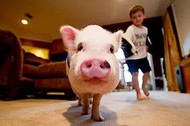Caring for Your Pet Pig
Jan 31st 2012
What kind of general health care do they need?
Males will grow tusks. The ivory tusks generally need to be trimmed every couple of years. This usually requires a vet visit. Hooves usually need annual trimming. Pigs that spend time walking on pavement or concrete are able to keep their hooves trimmed by themselves. Hoof trimming can be done by a vet or, with patience, and the pigs permission, by the pig’s family members. Pigs do not get fleas, but they can get ticks! Although ticks have a hard time dealing with the tough hide of a pig. Biting insects can be very bothersome to a pig. White pigs are prone to sunburn and need protection such as children’s sunblock (fine mist sunscreen spray is easiest to apply). They have naturally flaky skin and generally shed their bristles once per year, usually in the summer, on the average (sometimes less). They have virtually no odor (males will if they are not neutered!).
Obesity is one of the greatest health problems potbellied pigs face. Lots of roughage (grass, greens, fruits and vegetables) is very important to their health and well being. In Vietnam they subsist on water plants and whatever else they mange to forage. They are not fed “high density” corn and soybean containing feed! An additional problem is that over the thousands of years of domestication, they have been bred to be passive and lazy. In other words…they have a tendency to sit around and get fat! Unfortunately, this is not healthy for the pig!
What is their personality like? Pigs are highly intelligent, social, affectionate herd creatures. They have been called sly and devious and have been compared to a 2-3 year old child as far as emotional maturity. Because pigs are very intelligent, they get bored easily. A pig confined to a house all day may (but not always) amuse itself any way it can; eating wallpaper, rooting up linoleum, tipping tables, opening kitchen cupboards and the refrigerator. Therefore, it is strongly recommended that all pigs have regular access to a yard or grassy area and ScratchnAll pads for self-enrichment and enjoyment.
Apply the ScratchnAll pads at several different areas. Rooting is an essential part of a pigs behavior, therefore a manicured lawn and a pig don’t co-exist well. They will use their considerable brain power to get to whatever food might be available. Gardens and flower beds must be protected from the might of the porcine snout! Experience has shown that, in general, pigs that live outside with other pig companions tend to have fewer behavior problems as they mature. Many times problems don’t surface until the pig is 2-3 years old (which is the age a potbellied pig reaches maturity). Although some potbellied pigs have successfully been kept as “only” pigs, it has been found that generally pigs are better socialized when living with at least one other pig.
If possible, adopting pigs as pairs of siblings is desirable. “Only” pigs have a greater tendency to be aggressive and assertive. It is actually easier to care for two well-adjusted pigs than one spoiled, demanding and possibly aggressive pig. Pigs are generally very social and affectionate creatures (unless pretty much left alone most of the time, then they can become very unsocial and independent). They need and love all the attention they can get.
They will flop on their sides for tummy rubs and love having their tough hide scratched and brushed. Given a lot of attention, they generally enjoy just being close and seem to prefer lying on their human companions feet.

